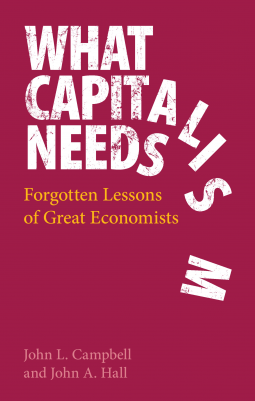
What Capitalism Needs
Forgotten Lessons of Great Economists
by John L. Campbell, John A. Hall
This title was previously available on NetGalley and is now archived.
Send NetGalley books directly to your Kindle or Kindle app
1
To read on a Kindle or Kindle app, please add kindle@netgalley.com as an approved email address to receive files in your Amazon account. Click here for step-by-step instructions.
2
Also find your Kindle email address within your Amazon account, and enter it here.
Pub Date Sep 02 2021 | Archive Date Sep 02 2021
Talking about this book? Use #WhatCapitalismNeeds #NetGalley. More hashtag tips!
Description
From unemployment to Brexit to climate change, capitalism is in trouble and ill-prepared to cope with the challenges of the coming decades. How did we get here? While contemporary economists and policymakers tend to ignore the political and social dimensions of capitalism, some of the great economists of the past - Adam Smith, Friedrich List, John Maynard Keynes, Joseph Schumpeter, Karl Polanyi and Albert Hirschman - did not make the same mistake. Leveraging their insights, sociologists John L. Campbell and John A. Hall trace the historical development of capitalism as a social, political, and economic system throughout the twentieth and early twenty-first centuries. They draw comparisons across eras and around the globe to show that there is no inevitable logic of capitalism. Rather, capitalism's performance depends on the strength of nation-states, the social cohesion of capitalist societies, and the stability of the international system - three things that are in short supply today.
Advance Praise
"This superb book reminds us of one enduring insight. Economists like Smith, Hirschman, List, Keynes, Schumpeter, and Polyani understood what modern economics has forgotten. Capitalism does not flourish when markets are fully free. It thrives when they are socially embedded and politically well governed. A turbulent twentieth century has made this pandemic moment ripe for this timeless reminder." Peter J. Katzenstein, Cornell University
"Inspired by the insights of six key economists, Campbell and Hall offer a masterful interpretation of the global political economy from the early twentieth century until today. What political and economic conditions enabled the golden era of prosperity after the trauma of the Second World War? Why did this period end as economic inequality combined with slower growth, greater instability, and resurgent intolerance? And what lies ahead, as China assumes a leading role in the world’s economy? In a compelling and carefully researched analysis, the authors identify the critical conditions upon which the viability of global capitalism depends and map out ways to meet the challenges of the future." Bruce G. Carruthers, Northwestern University
"A capitalist economy is never pure capitalism. Its operation is, as John Campbell and John Hall show us so clearly and effectively, both supported and impeded by an array of institutions and government policies, and it produces consequences that themselves affect the economy’s functioning." Lane Kenworthy, University of California, San Diego
Available Editions
| EDITION | Hardcover |
| ISBN | 9781108487825 |
| PRICE | $24.95 (USD) |



